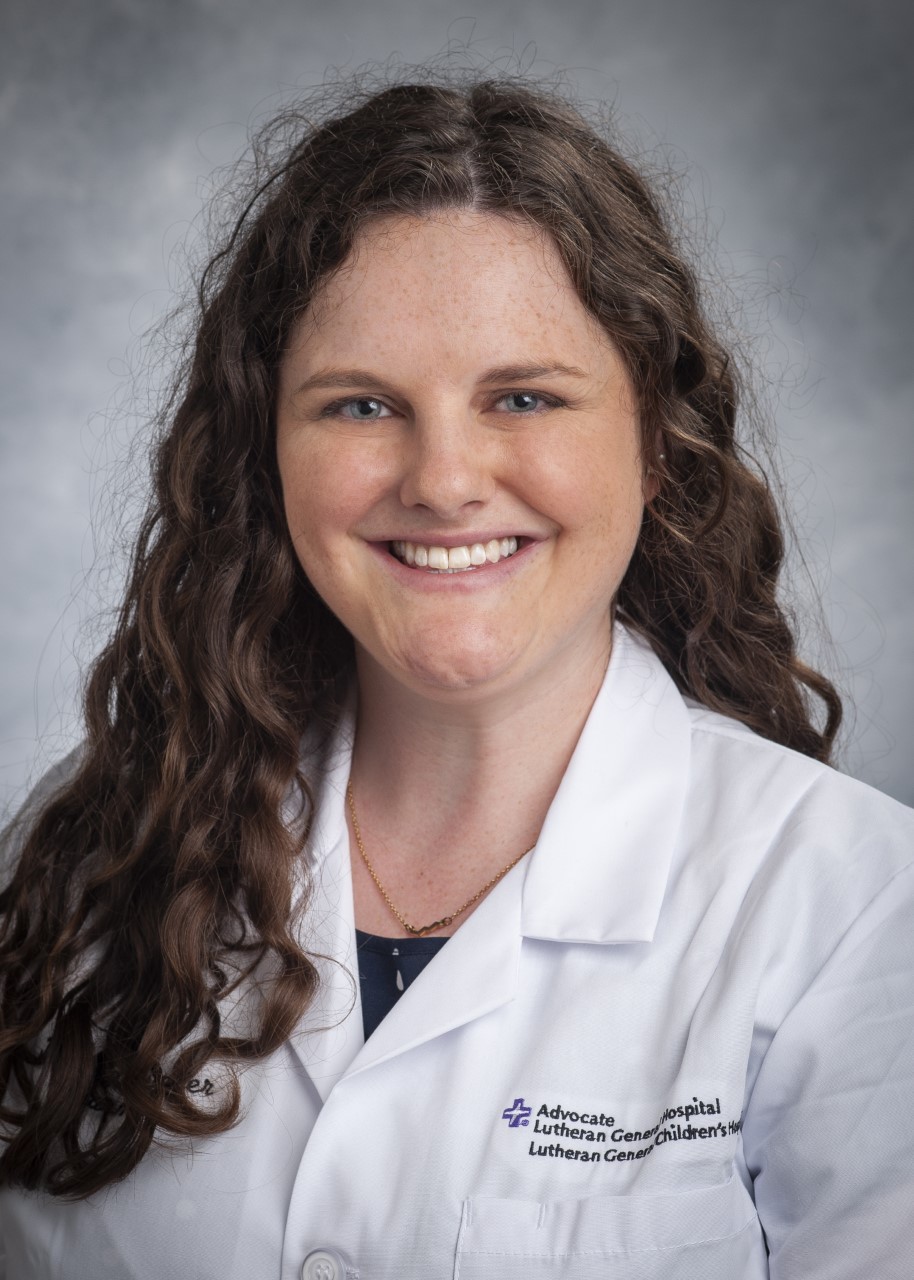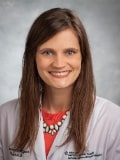Residency preceptors

Jill Starykowicz, Pharm.D., BCCCP
Title: PGY-2 Critical Care Residency Program Director; Clinical Pharmacy Specialist, Cardiology/Critical Care
Education: Pharm.D., University of Illinois at Chicago, 2006
Training: PGY-1, University of Illinois at Chicago, 2007; PGY-2 Cardiology, University of Massachusetts Medical Center, 2009
Practice Area: Medical and Cardiac Intensive Care Unit (MCICU)
Research Interests: Delirium in the critically ill, targeted temperature management, invasive cardiac monitoring and anticoagulation
Email: jill.starykowicz@aah.org
Medical/Cardiac Intensive Care Learning Experience:
The MCICU and Interventional Unit consists of a 32-bed unit with 10 beds devoted to cardiology and the remaining dedicated to the medical intensive care service. The learning experience is designed for pharmacy residents to develop the skills, knowledge, and values expected by a clinical pharmacy specialist practicing in critical care medicine and tailored to the resident’s previous critical care experience. Residents participate in multidisciplinary bedside rounds with an attending physician, medical residents and interns, nurses, clinical pharmacist, and respiratory therapy. This team meets daily to discuss and optimize patient care. In addition to working bedside rounds, teaching rounds occur daily to cover critical care topic discussions and issues related to patients in the unit.

Amina George, Pharm.D., BCCCP
Title: PGY-2 Critical Care Residency Coordinator; Clinical Pharmacy Specialist, Neurocritical Care and Operating Room
Education: Pharm.D., University of Illinois at Chicago, 2008
Training: PGY-1, Advocate Lutheran General Hospital, 2009
Practice Area: Neurocritical Care Unit
Research Interests: Stroke, Traumatic Brain Injury
Email: amina.george@aah.org
Neurocritical Care Unit Learning Experience:
The Neurocritical Care Unit (NCCU) is a 9 bed ICU that specializes in the care of patients with various pathologic neurologic conditions including, but not limited to, stroke, isolated traumatic brain injury, and status epilepticus. The NCCU is managed by Neurointensivists and Advanced Practice Nurses. The learning experience is designed for pharmacy residents to identify and develop the skills, knowledge, and values necessary to practice in an intensive care setting, with an emphasis on neurologic disease state management. Residents participate in multidisciplinary bedside rounds with an attending physician, APNs, nursing staff, clinical pharmacist, respiratory therapist, and medical residents and students. This team meets daily to discuss and optimize patient care.

Karen Caylor, Pharm.D., BCPS
Title: Clinical Pharmacy Specialist, Pediatric Critical Care
Education: Pharm.D., University of Illinois at Chicago, 2007
Training: PGY-1, Advocate Lutheran General Hospital, 2008; PGY-2 Pediatrics, University of Illinois at Chicago, 2009
Practice Area: Pediatric Intensive Care Unit
Research Interests: Vancomycin dosing and kinetics in pediatrics, dexmedetomidine use in PICU patients, and opioid and benzodiazepine withdrawal in children
Email: karen.chincaylor@aah.org
Pediatric Intensive Care Learning Experience:
The pediatric intensive care unit (PICU) learning experience focuses on the provision of pharmaceutical care services to the pediatric population. The PICU is a 16- bed unit that encompasses patients ranging in age from newborns to adolescents. The patient population includes traumas, post-operative cases, and general medical issues. Residents participate in daily rounds with an interdisciplinary team, of which responsibilities include: review of patient profiles, provision of drug information, development of evidence based therapeutic plans, and development of short and long-term monitoring plans. Residents also assist with pharmacokinetic monitoring, providing parenteral nutrition support, and participating in pediatric emergencies. Residents participate in one to two topic discussions each week. Topics include but are not limited to septic shock, traumatic brain injury, seizures, diabetic ketoacidosis, pressors/neuromuscular blockers, pulmonary hypertension, continuous renal replacement therapy, and extracorporeal membranous oxygenation. Residents provide education through inservices and formal presentations to the pharmacy staff, physicians, and nurses.

Jill Argotsinger, PharmD, BCIDP
Title: PGY2 Infectious Diseases Residency Program Director; Clinical Pharmacy Specialist, Infectious Diseases; Advocate Lutheran General Hospital
Education: PharmD, Butler University, 2018
Training: PGY-1, Conemaugh Memorial Medical Center, Johnstown, PA, 2018 - 2019; PGY2 Infectious Diseases, Advocate Lutheran General Hospital, Park Ridge, 2019 – 2020
Practice Area: Infectious Diseases, Antimicrobial Stewardship
Research Interests: multi-drug resistant gram-negative infections, Pharmacokinetics/pharmacodynamics of antimicrobials, antimicrobial stewardship and resistance
Email: jill.argotsinger@aah.org
Infectious Disease Learning Experience Description:
TThe Infectious Diseases (ID) learning experience is designed for pharmacy residents to expand their ID knowledge and apply clinical and problem-solving skills necessary to assess, evaluate, and develop empiric pharmaceutical care plans, and provide antimicrobial stewardship recommendations for patients with suspected or documented infectious disease states to the multidisciplinary infectious diseases team in order to optimize a patient’s antimicrobial regimen. Based on the resident’s interest, the learning experience may be split between rounding with the adult/pediatric infectious diseases consult services and antimicrobial stewardship. The resident is expected to lead and actively participate in topic discussions to develop knowledge of disease states with which the resident may not be familiar with and/or to increase depth of knowledge of pathophysiology, drug therapy or clinical guidelines. In addition to the required learning activities, the resident may be expected to attend and participate in interdisciplinary conferences/meetings (Antimicrobial Stewardship, Infection Prevention, etc.).

Amish Doshi, Pharm.D.
Title: Clinical Pharmacy Specialist, Surgical Intensive Care
Education: Pharm.D., St. Louis College of Pharmacy, 1997
Training: PGY-1, Advocate Lutheran General Hospital, 2003
Practice Area: Surgical Intensive Care
Research Interests: Traumatic brain injury and sedation and analgesia in critically injured patients
Email: amish.doshi@aah.org
Surgical Intensive Care Learning Experience:
The Surgical Intensive Care Unit (SICU) is a 14 bed closed unit which is comprised primarily of trauma, cardiovascular surgery, neurosurgery, orthopedic, and general surgery patients. Lutheran General Hospital serves as a site for surgical resident training. Residents choosing to rotate through the SICU would participate in multidisciplinary trauma rounds providing recommendations on medication therapy and monitoring as well as reviewing medication therapy for non-trauma patients. Opportunities to provide informal pharmacotherapy education during rounds and formal lectures during noon conference or morning report to our surgical residents may be available. Attendance at various committee meetings throughout the hospital is required.

Elizabeth Hart, Pharm.D., BCCCP
Title: Clinical Pharmacist II
Education: Pharm.D., University of Illinois at Chicago, 2017
Training: PGY-1, University of Illinois at Chicago, 2018; PGY-2 Critical Care, Advocate Lutheran General Hospital, 2019
Practice Area: Emergency Department
Email: elizabeth.hart@aah.org
Emergency Medicine Learning Experience:
The emergency department (ED) is a training site for emergency medicine residents from the University of Illinois at Chicago, internal medicine and family practice residents from Lutheran General, medical and pharmacy students. The department has 42 adult and 9 pediatric beds. There are approximately 71,900 visits per year resulting in approximately 17,975 inpatient admissions. During the ED learning experience, pharmacy residents conduct medication histories and perform medication discharge counseling. They serve as a resource to physicians and nurses as drug information specialists and aid in the selection and dosage of medications prescribed in the Emergency Department. Other activities performed include in-services to the ED staff, attending traumas and cardiac arrests, topic discussions, reviewing patient charts, and completion of various projects. Residents assist in the care and monitoring of critical care patients in the ED. Due to the unpredictability of the work load and patient acuity, timing and volume of activities will vary.
